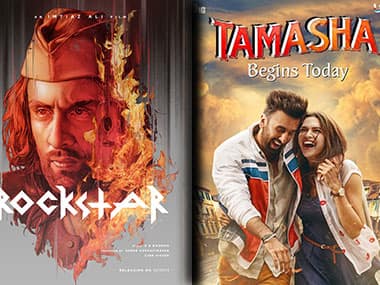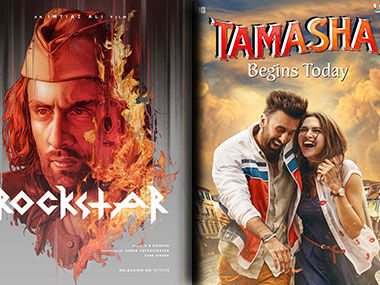Rockstar was an anomaly of a film. Saddled with perhaps one of the worst female leads in Hindi cinema, playing what was a relatively strong female character for a big commercial romance, it was ostensibly a disaster from the moment Nargis Fakhri says her first line of dialogue. Then, there was the near-mystical narrative crafted by Imtiaz Ali and editor Aarti Bajaj. For most, the film hardly seemed put together like a film at all, transcending geography and time periods as if being coherent in space and time hardly matters for the Indian audience. Indeed, an opinion poll will probably reveal that far more people dislike the film than otherwise. Save for Ranbir Kapoor’s living, breathing, alcohol-shunning, angst-y stoner Jordan and A R Rahman’s score that gently coated the soul of the film (which Imtiaz infused with his love for love), Rockstar was heavily panned by the public (and even most critics). And yet. Rockstar has a cult following of its own; a section of the audience for whom the film is far more than just a film. It’s a spiritual experience about love and loss; about success and failure; about ambition and destruction. In its heavily flawed, quasi-cryptic narrative, weakened further by Fakhri’s debilitating presence, some people found an inexplicable quantum of solace. Tamasha, on the other hand, is instantly an easier film to like, even before you begin watching it. One can’t not be wowed by Ranbir and Deepika. Perhaps deep down, the Indian cinema-goer believes that at least in some dimension, the two of them belong together. They’re gorgeous, they’re spunky and they’re talented. Just the sight of Ved and Tara – the characters they play – in golden-brown Corsica streaked with aqua-blue is something that will make even cynics at least consider watching the film. [caption id=“attachment_2525652” align=“alignleft” width=“380”]  Rockstar and Tamasha.[/caption] But once you do watch the film, you’ll realize that in so many ways, Tamasha and Rockstar are companion pieces. For starters, they’re both archetypes of arcane cinematic cutting from the Aarti-Imtiaz oeuvre. (When Aarti Bajaj will truly get her due is a question for another day.) They are love stories, yes; but they are actually less about the love story and more about how being in love with the woman makes the man discover himself. In case you’re wondering, this isn’t a case of Imtiaz Ali showing some sort of gender bias. Case in point: Highway. It was the woman’s film. Imtiaz’s cinema is always about the character/s. The gender matters only in the context of the film, never in the theme itself. In that sense, Imtiaz’s films are almost gender-neutral. In Rockstar, the journey of self-discovery for Jordan was rocky and uneven. In fact, some of the discovery happened even before he met Heer. It was the angst burning within that found an outlet because of Heer’s presence in his life. She makes him stop chasing what he wants, and in the process, he ends up getting it. Ved’s journey in Tamasha is a lot more staid, and it’s treated with a lot more maturity. Ved doesn’t know what he wants. He just knows that he doesn’t want what he has. A childhood love for being the rapturous one-person audience to the local raconteur is his only escape. And then, there’s that conundrum which Ved – and the audience – has to grapple with. Is imtiaz Ali emphatically stating that every story is indeed the same? Is he taking pride in what has been hurled at him as an accusation? Not really. If anything, he’s responding to it. Rockstar and Tamasha are incredibly similar, and yet they are vastly different. The one line story may be the same. But again, with Imtiaz Ali, it isn’t the story that matters, but the character. Ved needs Tara as a cocoon for his suppressed alter-ego. In both films, there’s no explanation for why the woman has such unfathomable effects on the man, and this lack of explanation is explicitly stated in each film. Heer and Tara aren’t merely women; they are concepts. They are the cure for whatever illness afflicts the minds of Jordan and Ved respectively. The films differ in the way these concepts affect the protagonists. As the oft-repeated saying goes, it isn’t about the destination, but about the journey. And every journey is different. The Ranbir-Imtiaz association is another journey that will doubtlessly continue. This actor-director pair brings out an intangible intensity to the travails in the path of desire; it may not find universal appeal, but it strikes at the souls of those for whom their films are meant. Their subsequent films together will probably always have the same story. And yet.
Tamasha and Rockstar are less about the love story itself, and more about how being in love with the woman makes the man discover himself.
Advertisement
End of Article


)
)
)
)
)
)
)
)
)



